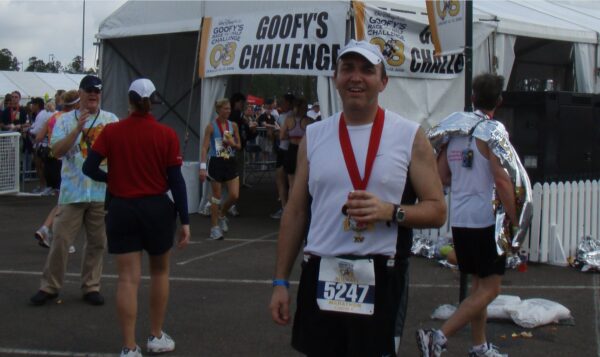Recover post marathon isn’t just a break—it’s your next training phase in disguise.—It’s your next real training phase. You’ve crossed the finish line. Your medal might still be catching the sunlight on a doorknob. Your legs are heavy, your heart is full, and your calendar suddenly feels… empty. That’s where the post-marathon plan comes in. Whether it was your first or your fifth race, this is how you safely rebuild, mentally and physically. Let’s walk this next mile together—with purpose.

You’re not expected to follow this plan perfectly. But giving your recovery some shape—that’s how you stay strong, steady, and proud of what comes next.
🧠 The Mind After 42.2K – You’re Not Just Tired, You’re Changing
Crossing a marathon finish line changes you. For weeks or even months, every decision revolved around your training plan. Now the silence afterward can feel disorienting. That’s normal. It’s not just your legs that need recovery—it’s your identity as a runner.
I’ve seen many feel lost post-race. That’s why a gentle structure can make all the difference. Having a clear post-marathon recovery plan lets your body heal while keeping your running mindset intact.
We don’t talk enough about the psychological reset needed after a marathon. Many runners experience a dip in motivation or even mild depression. Why?
Because your big goal is behind you. You’ve achieved something incredible—but you might not yet know what comes next.
That uncertainty can drain your drive. I always encourage runners to honor this transitional time. Journal your experience. Celebrate it.
Share your story. Your recovery is not just physical—it’s your opportunity to grow into an even wiser athlete.

🧬 What Happens to Your Body After the Marathon?
After 42.2 kilometers, your muscles carry micro-tears, and your glycogen depots are depleted.
This isn’t just soreness—it’s a biological rebuild zone. Your heart rate might stay elevated for days. Even your immune system dips.
Often, we feel “fine” a few days later, only to feel energy low points by midweek. That’s why full recovery isn’t optional—it’s foundational.
Pushing through without proper care? That can lead to burnout, injury, or worse, losing your love for running.
Muscle damage peaks around 48 hours after the race. Inflammatory markers spike. White blood cell counts drop.
You may feel sore, sluggish, even flu-like. These are all normal signs that your body is using every resource to repair what it’s endured.
Think of recovery like an internal construction zone: tissues are rebuilding, hormones are balancing, and your central nervous system is recalibrating.
For newer runners, it can be tempting to prove you’ve “bounced back” fast—but speed isn’t the goal here. Strength is. Health is.
The way you treat your body after a marathon will affect your future performance far more than a couple of rushed runs ever could.
⭐ Week 1 – Embrace Active Recovery With Compassion
Your first week is about rest, but not the couch kind. Instead, keep the blood flowing with light movement.
Walking, swimming, or an easy 20-minute spin on a bike helps reduce inflammation and boost tissue repair. I always remind runners to check their morning resting heart rate.
If it’s 10% higher than normal, take another rest day. This is your time to relax, but with intention.
Resting doesn’t mean doing nothing—it means doing the right things. Gentle movement increases blood flow, helping your body flush out waste products like lactic acid and bring in nutrients to speed healing.
Hydrotherapy is excellent this week: try walking in water, floating, or light swimming to give your joints a break. Light stretching and foam rolling can ease stiffness, but be cautious with aggressive massage.
Sleep is your superpower this week. If you’ve been running with a sleep deficit, now’s the time to restore it fully. Aim for 8+ hours per night, and take naps if needed.
Your immune system is vulnerable after the race, so nourish it with high-quality food: lean proteins, colorful veggies, healthy fats, and lots of water.
Consider magnesium and omega-3s to support inflammation control. The first week post-marathon is about creating a soft, nourishing space—physically and emotionally.

In your next phase, try using the HR feedback method with heart rate training zones.
🚶♀️ Week 2 – Gentle Jogging and Listening to Your Body
When the muscle soreness starts fading, it’s tempting to dive back in. But this week is about gentle running—nothing more.
Try running on soft trails or grass to reduce impact. Add 20–30 minute jogs, but intersperse them with cross-training days.
This is also the time to test elliptical workouts, which mimic running but with less stress on your joints.
Start with one or two 20-minute jogs this week. Stay conversational—no pressure, no pace goals. I often advise runners to leave the GPS watch at home.
Just run to feel. Use the elliptical or stationary bike on alternate days to keep fitness up without stressing joints. Think of this as your bridge week: you’re testing the legs, but gently.
Your body may give you mixed signals. One day you feel fine, the next—fatigue returns. That’s normal. You’re still in flux. Don’t judge your runs this week; just observe.
This is the time to practice body awareness: noticing stiffness, soreness, or mental resistance—and responding with kindness, not criticism.
Be sure to also hydrate well before and after these sessions. You’re still flushing out remnants of the marathon effort. You may find your hunger is a little off, or your digestion is still recovering.
Keep meals small, regular, and balanced. Light smoothies with bananas, nut butters, and a bit of greens can be great post-run.
Even five minutes of light yoga or breathwork after a jog can support your system. This second week is not about chasing any gains.
It’s about calming the nervous system and affirming to your mind that training is still part of your life—without being overwhelming.
Need help tracking effort? Try the perceived effort scale from our Borg scale training guide.
🏗️ Week 3 – Rebuild Strength and Renew Routine
This is the week where your identity as a runner begins to reawaken. Add in light strength training—bodyweight squats, lunges, and core work.
Return to 3–4 runs per week, but keep the effort light. You’ve likely lost some top-end speed—but that’s okay. Speed returns quickly when built on a strong foundation.
Your aerobic fitness is still there, quietly waiting. Start nourishing it again with steady movement. Your body will remember. Your mind will follow.
Rebuilding doesn’t mean doing more—it means doing smarter. Add short strides or hill walks to fire up muscle memory without overloading the system.
Strength work should be functional, focusing on mobility and control. Think: Eliptical trainer, single-leg squats, resistance band glute work, and core circuits that support your spine.
This is also a perfect time to check in with your running form. Now that you’re not racing, focus on posture, cadence, and breath.
Revisit drills. Reconnect with your why. You’re not just running again—you’re building the version of you who will race better next time.
Take note of how your body handles volume this week. If a 45-minute run leaves you energized and not wiped out, that’s a great sign. If it doesn’t, pull back. Keep journaling.
Write down three positive things about each run—even the ones that feel hard. This keeps your recovery mindset grounded in gratitude and growth.

🧘 Week 4 – Restore Your Base and Add Strides
You’ve earned the chance to feel fast again—but without pressure. This week, introduce strides after easy runs: 5–8 short bursts (100 meters) focusing on good form, not speed. Strides stimulate your neuromuscular system without overloading the legs.
They’re refreshing and mentally energizing. This is also a great time to reflect and write down your next goal. Whether it’s a 10K or another marathon, that clarity keeps motivation alive.
Strides are short, controlled accelerations that help you transition from the marathon’s slow rhythm to a more varied pace again.
Think of them as controlled play: 20–30 seconds of graceful movement, focusing on posture, arm swing, and lightness. After weeks of slower, steady work, strides awaken speed gently.
I often suggest runners add two stride sessions this week after easy 30 to 40-minute runs. Focus on good technique, a tall posture, and relaxed breathing. Between strides, walk or jog slowly for 1–2 minutes. This is not sprinting—it’s controlled elegance.
You can also begin increasing your weekly mileage slightly—but stay at 60–70% of your peak pre-marathon volume.
Two or three easy runs, one stride session, and a steady long run (no longer than 65–70 minutes) can help reintroduce a familiar rhythm.
Use this week to refine your running form again. Gentle drills, such as high knees, and butt kicks, re-engage your coordination and footwork.
Incorporate 1–2 light strength sessions focusing on balance and hip mobility. Rebuild without rushing.
This phase also signals a return to more structured thinking—but don’t lose the joy of free movement. Run with a friend.
Change routes. Listen to your favorite podcast. Let this week reinforce that running can be light, nourishing, and playful again.

⚡ Week 5 – Resume Steady Runs and Light Tempo Work
By now, you’re likely craving structure again—and that’s perfect. Start adding light tempo segments (10–15 min) into your runs. Steady runs should also return.
This isn’t “go hard” week—it’s “rebuild confidence” week. Training again should feel like coming home, not a rush to prove anything or make comparisons. One runner’s recovery is not another’s blueprint. What matters is how you feel—and that you’re starting to enjoy the rhythm of training again.
Tempo work at this stage should feel comfortably challenging. Aim for effort, not pace. A good guide is your perceived exertion: you should be able to speak in short phrases but not hold full conversations. Keep these efforts short and sweet. One quality session per week is enough.
Your total weekly mileage can now reach 75–80% of pre-marathon levels. Long runs may stretch to 75–90 minutes depending on your fitness level.
Stick with easy terrain and avoid technical trails or high elevation. Your body is regaining form—don’t overload it just because it feels good again.
Nutrition and hydration should remain priorities. As mileage increases, so do your fueling needs. Focus on post-run recovery meals with a 3:1 carb-to-protein ratio.
Recovery shakes, scrambled eggs on toast, or yogurt with fruit are great choices. Support your digestion with probiotics and continue eating anti-inflammatory foods.
Finally, this week is a mental checkpoint. Journal how you feel. Reflect on your journey from race day to now.
You’ve allowed yourself to pause, rebuild, and now move forward with renewed intention. That’s the power of planned recovery—it makes you stronger than before.
To explore tempo strategy in more depth, check out our post on lactate threshold training.

📊 Visual Recovery Timeline
| Week | Focus | Activities |
|---|---|---|
| 1 | Active Rest | Swim, cycle, massage, walking |
| 2 | Easy Running | Jogging on soft trails + cross-training |
| 3 | Rebuild Fitness | Light runs + strength training |
| 4 | Restore Running Economy | Easy runs + strides |
| 5 | Return to Structure | Steady runs + light tempo segments |
🧠 Final Thoughts – Recovery Is Training
Sometimes the hardest part of running isn’t the long run—it’s waiting to feel like yourself again. But I promise: recovery isn’t a detour.
It’s the path forward. When you recover post marathon with intention, you build a foundation deeper than mileage. You become more attuned, more resilient, and more ready.
The runners I’ve coached who embraced recovery came back not just stronger, but wiser. They turned quiet miles into lessons. Recovery became their secret strength.
They ran better, trained smarter, and appreciated their journey more deeply. That’s what this 5-week reset is all about—not perfection, but reconnection.
So don’t rush your comeback. Honor your race, your body, and your growth. Keep journaling. Stay curious. Run easy when it feels right. Rest when it doesn’t. Let your progress come from patience.

❓ FAQ – Post Marathon Recovery for Beginners
Q: Can I run the week after my marathon?
A: In Week 1, it’s better to focus on swimming, walking, or cycling. Running too soon delays healing and increases injury risk.
Q: How long should I wait before serious training?
A: Most runners resume structured training by Week 5. Your experience level, race effort, and recovery signals should guide you.
Q: What should I eat during marathon recovery?
A: Focus on whole foods rich in protein, anti-inflammatory fats, and colorful produce. Prioritize hydration and sleep as well.
Q: Is soreness normal even 10 days post-race?
A: Yes—especially in new marathoners. Microtrauma in muscles can linger. Use low-impact movement to help flush it out.
Q: Will cross-training keep my fitness?
A: Absolutely. It maintains cardiovascular strength while giving your legs a break. Think of it as active maintenance, not a pause.
💬 “You don’t bounce back. You build back. And you’ll build back stronger than ever.”
📤 Know someone who just finished their marathon? Share this post with them and help them recover with care. 💌






Thank you so much for all you have shared here and I must day that I really fancy all you have said here. Recovering from marathon can be rather stressful if not properly planned ahead of time. With this guide here, it would be taken as a gradual process rather than taking it as compulsory recovery within few days. Good one
Hi Nath
Thank you for the comment. You got it, it’s about gradual building up again and as result after the recovery process, you will be stronger than before the race and can make your choices for the future from a ‘high point’ state.
Be Well
Hello Henrik, thanks to you for such a wonderful article. I have been involved in Marathon races a couple of times and it wasn’t so easy on my first trial because after the race I went home an couldn’t walk well for about two days and I felt really sad. Seeing this article I really feel there is so much I need to do to be better and I will start working on it immediately
Hi Justin
Thank you for the comment. Many of us feel the same way as you describe here in the first days after a marathon. To relax in water with easy swimming could be a good start to recover again.
Be Well